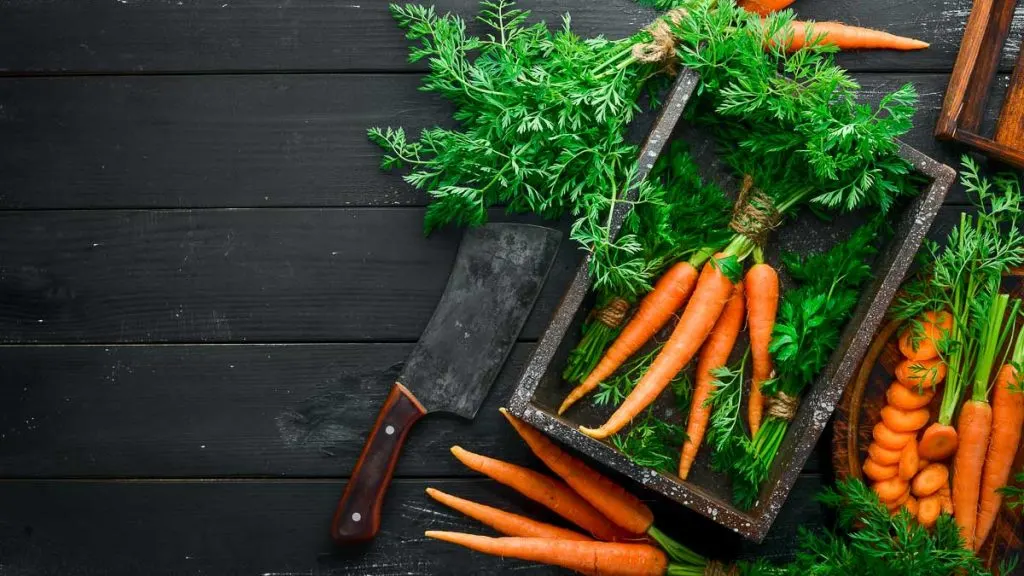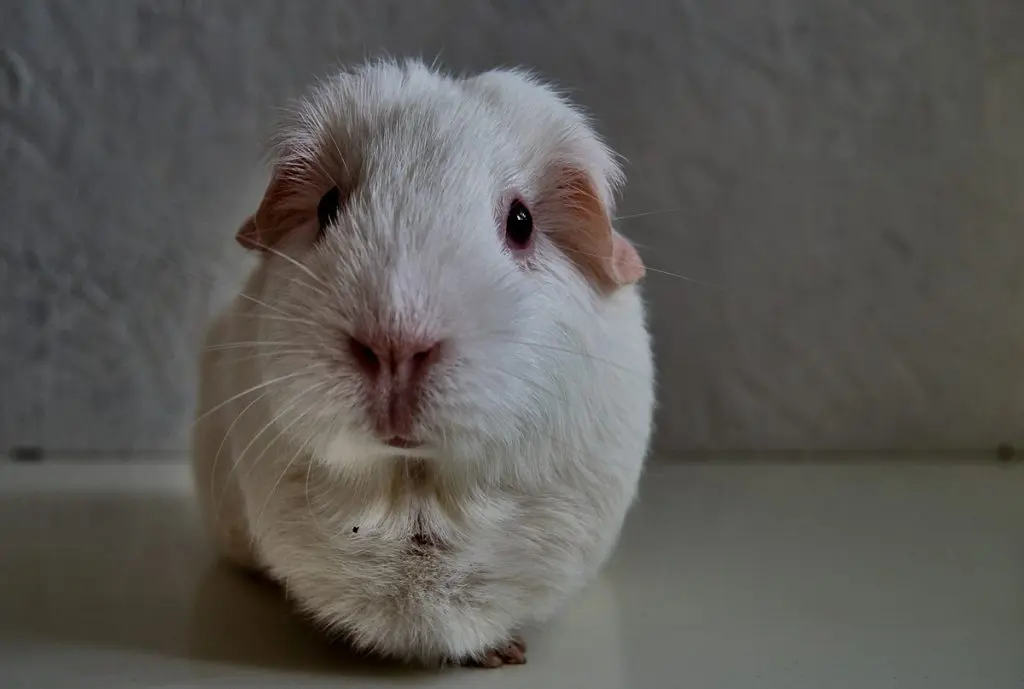Lady Feeds Guinea Pig Carrots in Line
Jump to How-To
Can Guinea pigs eat carrots safely? Guinea pigs are by far one of the most popular pocket pets. Who can resist feeding these cute little friends a crisp treat like a bright orange carrot. Guinea pigs can eat carrots, only when served in the proper form and in moderation. Dr. Jess explains how to feed your guinea pig carrot safely, below:

A guinea pig is a pocket pet that is a part of the cavie family of animals, weighs up to 2.5 pounds as an adult, and with proper care, can fairly commonly be seen to live to 8 – 10 years of age.
What Do Guinea Pigs Typically Eat?
Guinea Pigs eat a variety of things to keep them healthy and happy.
- High-qualityguinea pig food andTimothy hay should be the main staples of their diet.
- Up to about 10% of their diet can be made up of an assortment ofvegetables and fruits, with fruits and vegetables over 12-24 hours old being discarded as soon as possible.
- They require 30 – 50 mg ofvitamin C daily from their diet, either in their guinea pig food, a vitamin supplement, or from fruits and vegetables that are high in vitamin C. I'll get to this more here in a sec…
- Guinea pigs do best with dietslow in fats and sugars.
- Clean, fresh, filtered, chlorine-freewater. 'Fresh water' means that is is changed daily. 'Changed daily' means that new water is placed into a CLEAN water dispenser!
Let's Talk Carrots:
Carrots are a type of root vegetable that belong to part of the nightshade family of veggies.
They come in many different colors such as orange, yellow, white, purple, red, and even black.
They also come in many different sizes and shapes, from long and slender, to short and stumpy, and everything in between.
The taproot (the orange section of your typical common carrot) is typically what is consumer here in the United States, but the stems and leaves can also be eaten, although less popular.
Carrots are typically eaten raw or cooked by boiling, steaming, frying, and can be seen in many dishes such as soups, salads, stir frys, vegetable medleys, and even in cakes such as carrot cakes. Carrot varieties can also be seen in many baby foods and pet foods as well.

Carrot Nutrition:
Carrots have many known health benefits associated with them. But let's start with their nutritional profile and move on from there to talk about how guinea pigs can safely eat certain forms of carrots.
Healthline does a wonderful job summarizing the basics of carrot nutrition:
'Carrots are about 10% carbs, consisting of starch, fiber, and simple sugars. They are extremely low in fat and protein. Carrots are a good source of several vitamins and minerals, especially biotin, potassium, and vitamins A (from beta carotene), K1 (phylloquinone), and B6.'
https://www.healthline.com/nutrition/foods/carrots#nutrition
A raw carrot is a rich source of vitamin B6 and vitamin C. However, once the carrot is cooked, the amount of both of these vitamins diminishes dramatically.
Good Source of Vitamin A and C:
Many people have heard that carrots contain a large amount of vitamin A.
Vitamin A has been shown to help with eyesight in low light situations and also can play a role in macular degeneration prevention.
Carrots have a healthy dose of vitamin C in them – a vitamin that helps with the protection of important body systems that keep the body running and functioning appropriately.
Even a cooked carrot will offer vitamin A and C when ingested.
Carrots also contain a notable amount of vitamin K as well.
Contains Antioxidants That May Decrease Chance of Cancer:
Multiple research studies have shown that carrots are a fantastic source of anti-inflammatory compounds, which effectively can help fight different forms of inflammation.
Antioxidants are thought to help reduce inflammation inside the body by binding (attaching) to and suppressing (decreasing) inflammation-promoting molecules known as free radicals. [source].
Carrots are also a good source of certain antioxidants like lutein and zeaxanthin for example (both carotenoids), antioxidants that have been studied extensively to promote healthy bodies.
Studies have shown that antioxidants may help reduce cancer cell growth, decrease inflammation reactions, and improve overall health.
Helps Digestive Function:
Carrots contain a healthy dose of fiber to help aid in digestion.
Your pet needs a balanced amount of fiber in their diets to keep their gastrointestinal tract healthy and moving and digesting food appropriately.
May Lower Blood Sugar Levels
Carrots contain high amounts of good-quality fiber and potassium, which may help regulate blood sugar levels [source].
This will come in handy if you have a diabetic pet or are trying to prevent your dog from becoming diabetic!
Potassium helps encourage blood vessels to relax, which will decrease the risk of high blood pressure occuring and other cardiovascular issues, such as heart disease.

Can Guinea Pigs Eat Carrots?
Guinea pigs can have carrots…. in moderation and served raw.
Never offer your guinea pig cooked carrots – the guinea pig's digestive system is not equipped to handle cooked vegetables like carrots and can make the guinea pig very sick.
Feeding a small amount of carrot as a treat to your guinea pig on occasion is totally fine and they will likely LOVE you for it!
Moderation = Approximately a 1-3 teaspoon-sized amount of carrot is enough carrot for one guinea pig.
If your pet does not eat all of their fruits and vegetables within 12-24 hours, then you need to dispose of it for them.
They will likely not eat it at this point, and it will only sit in their cage and get old and eventually become unsafe to eat.
The rest of their diet, the other 90 or so percent, should be made up of guinea pig food and hay.
You should feed this amount no more than one to two times per week and no two days in a row.
How To Feed Carrots to Guinea Pigs:
Materials
- 1 fresh, ripe carrot
Tools
- kitchen cutting board
- produce knife
Instructions
- Inspect the carrot for pests, dirt, and debris. Discard any carrot that can not be washed and cleaned.
- Clean your carrot by scrubbing the outer surface with water or veggie cleaner and rinse well. Pat dry.
- Cut or slice your raw carrot into guinea pig bite-size pieces.
- Offer your guinea pig 1-2 bite-size pieces and watch your guinea pig for 24 hours for adverse effects.
- Remove any uneaten carrot that can grow bacteria or attract pests if your guinea pig does not eat it.
Notes
Consult with your local veterinarian before adding or switching up your pet's diet. If your pet shows signs of adverse reaction to their diet, contact your vet immediately.
Are Carrots Harmful to Guinea Pigs?
Yes, carrots can be harmful in a few possible ways.
Carrots are high in natural sugars.
Therefore too much carrot fed to these little buddies can give them side effects like an upset stomach, gas, bloating, and diarrhea.
This can lead to a multitude of problems including things like dehydration and electrolyte imbalances that could impart a trip to the veterinary clinic for your pocket pet vet to fix.
These three factors to keep in mind include:
Harmful Reason #1: Loose Stool/Diarrhea
Too much of any fruit or vegetable can produce hypermotile, or increased movement, of one's digestive tract.
Some guinea pigs are more sensitive to additional foods or changes in their diets, so they are more likely to have loose stool and in some cases, full-blown diarrhea.
Other guinea pigs will not be impacted by any additional changes in their diets.
Harmful Reason #2: Allergic Reaction to Carrots
A guinea pig can develop an intolerance or an allergy to any food, so there is always the possibility that your pet is allergic to carrots.
If you suspect your guinea pig is allergic to carrots do NOT feed this food to your pet.
If your guinea pig is allergic to carrots and accidentally ingests it, go to your nearest animal emergency room immediately.
When this happens, the attack sets off a hypersensitivity reaction and can result in any of the following symptoms:

Common symptoms of adverse/allergic reaction to food:
- Nausea/vomiting
- Diarrhea
- Itching/Increased grooming
- Fever
- Lethargy
- etc.

ALTERNATIVE FRUITS FOR GUINEA PIGS:
- Blueberries
- Celery
- Pumpkin
- Squash
- Mango
- Strawberries
- Asparagus
- Courgette
- Grapes
- Sweet Potato
- Bananas
- Melon
- Butternut Squash
- Cilantro
- Zucchini
- Oranges
Wrap up:
Weigh the pros and cons of feeding carrots to your guinea pig before tossing them a crisp, orange snack, and if you do decide to give them a treat, remember, raw carrots are safe in moderation.
If you have questions about your pet's diet, contact your veterinarian before changing or adding items to their diet.
If you notice any adverse reactions after feeding your pet, let your vet know immediately for help.

Source: https://vetexplainspets.com/can-guinea-pigs-eat-carrots/
0 Response to "Lady Feeds Guinea Pig Carrots in Line"
Post a Comment